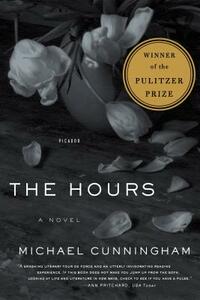Take a photo of a barcode or cover
I thought this book was excellent and - of course - thought-provoking. It’s a quite ostentatious endeavor, but one that is delivered well. The Hours invites (and initiates) a deep, quiet, unremitting contemplative-ness from which I haven’t quite emerged. Its cleverness and originality were a bit spoiled by my seeing the film first — this is assuredly a novel where one must read the book before seeing the movie. (Though, having seen the movie, there were all sorts of lingering amusements — as Clarissa Vaughn (played by Meryl Streep) contemplates the inaccessible and stunning immortality of Meryl Streep).
emotional
reflective
medium-paced
Plot or Character Driven:
Character
Strong character development:
Complicated
Loveable characters:
Complicated
Diverse cast of characters:
No
Flaws of characters a main focus:
Yes
i'm not really sure how to rate this one. i loved the surprising connectedness of it all, but it felt too short to really get to know any of the characters. which i suppose was the point, as it's only a single day...and the ending felt satisfying despite wanting more in the middle. such a conundrum
فكر نميكردم رمانى كه انقد خوندنشو پشت گوش انداختم به اين خوبى باشه . صفحه ى آخر باعث شد چهار امتيازم ، پنج بشه . . كمتر كتابى مثل اين خونده بودم ، كه مردى انقدر دقيق خصوصيات روحى زن ها رو شرح بده .. عالى . فقط حيف كه تو يه وقت كم و عجله اى خوندمش و لذتم هول هولى بود ..
dark
medium-paced
Plot or Character Driven:
Character
Strong character development:
Complicated
Loveable characters:
Complicated
Diverse cast of characters:
Yes
Flaws of characters a main focus:
Yes
emotional
hopeful
reflective
sad
medium-paced
i didn’t think woolf’s prose was remotely replicable, but cunningham attempts & for the most part succeeds to channel her voice. very thoughtful phrasing and plenty of room for rumination, the characters’ thoughts become yours and vice versa. i wasn’t sure how he was going to tie the storylines together toward the end & as soon as i figured it out, i gasped so loud. so so intelligent & thought provoking & memorable! absolutely fabulous!
dark
emotional
reflective
sad
tense
medium-paced
Plot or Character Driven:
Character
Richard, the character slowly dying of AIDS, thought of the hours in his life as burdens. “But there are still hours, aren’t there?” he told his friend Clarissa. “One and then another, and you get through that one and then, my god, there’s another. I’m so sick.” Clarissa accepted this, but in the poignant closing chapter, she also made her peace with it for she knew that these dark hours were part of life’s tapestry, along with the ones where everything falls right into place. While Clarissa had ultimately arrived at this kind understanding, Michael Cunningham’s other protagonists seemed to find it more difficult to understand that life would get better, but the novel closed with the knowledge that they tried—that no matter how difficult it was to live and find meaning, and that no matter how it ended, they truly and honestly tried. And there lies the ethos of The Hours and what made this all the more heartbreaking.
“There's just this for consolation: an hour here or there when our lives seem, against all odds and expectations, to burst open and give us everything we've ever imagined, though everyone but children (and perhaps even they) knows these hours will inevitably be followed by others, far darker and more difficult. Still, we cherish the city, the morning; we hope, more than anything, for more.”
“There's just this for consolation: an hour here or there when our lives seem, against all odds and expectations, to burst open and give us everything we've ever imagined, though everyone but children (and perhaps even they) knows these hours will inevitably be followed by others, far darker and more difficult. Still, we cherish the city, the morning; we hope, more than anything, for more.”
I was ambushed. My sister thrust her copy of The Hours into my hands, asking that I read it and let her know my thoughts.
Oh, the pressure.
(Pressure much like that pulsing in each of these characters. Wait a second...am I just another chapter?)
I haven't watched the movie. I haven't read [b:Mrs. Dalloway|14942|Mrs. Dalloway|Virginia Woolf|https://i.gr-assets.com/images/S/compressed.photo.goodreads.com/books/1646148221l/14942._SY75_.jpg|841320]. I did read [b:Orlando|18839|Orlando|Virginia Woolf|https://i.gr-assets.com/images/S/compressed.photo.goodreads.com/books/1443118010l/18839._SY75_.jpg|6057225] years ago in college and read [b:To the Lighthouse|59716|To the Lighthouse|Virginia Woolf|https://i.gr-assets.com/images/S/compressed.photo.goodreads.com/books/1639106809l/59716._SY75_.jpg|1323448] just this last year, however, and could pick up something of a similar tone in this. I think some familiarity of Woolf's work was helpful but certainly not required in order to read this.
So what did I think?
(Let me get my thoughts in order here before I have to present my case to my sister.)
I think that an accumulation of my thoughts and fears was stolen from me and placed in this book. Which is honestly a bit terrifying given the strong focus on mental health (and life and death). I wanted to dog-ear so many pages and put little pencil nicks next to all my favorite lines. Luckily, I remembered that this was not my copy.
This book focuses on three women and three timelines which are cleverly tied together at the end. I imagine that I could have figured out the connection if I had been looking for it, but as the writing was too beautiful to worry about solving a silly old mystery, I just enjoyed the ride and let myself be surprised (but not surprised surprised because it all made perfect sense and had really been in front of my face the whole time).
Each woman is facing pressures of some sort - children, relationships, career, societal.
Each woman is questioning her life - her past and her present and her future.
What is the perfect balance of excitement in life? Of contentment? What is joy? What is tragedy? What is too much, what is too little, what is acceptable?
Are we ever satisfied? Can we be when there is that moment that was the moment, the moment that no other moment will ever surpass, but you don't recognize it at the time?
This book made me spiral in the best way possible. I closed it with my chest tight, a little knot of anxiety that I had to slowly knead out. It's so beautifully written, so easy (and frightening) to identify with (especially as I get older).
I am trivial, endlessly trivial, she thinks. And yet. Going uninvited feels in some way like a minor demonstration of the world's ability to get along without her. Being passed over by Oliver St. Ives (who probably did not consciously exclude her but simply did not think of her at all) resembles death the way a child's shoebox diorama of a historic event resembles the event itself. It's a tiny thing, bright, shabby, all felt and glue. But nevertheless. It isn't failure, she tells herself. It isn't failure to be in these rooms, in your skin, cutting the stems of flowers. It isn't failure but it requires more of you, the whole effort does; just being present and grateful; being happy (terrible word). People don't look at you on the street anymore, or if they do it is not with sexual notions of any sort.
In under 230 pages, this book touches on where I've been, where I am, and where I may be. At the same time, it's not me at all. How is that possible?
This is bleak -
"But there are still the hours, aren't there? One and then another, and you get through that one and then, my god, there's another."
But it is also hopeful -
We live our lives, do whatever we do, and then we sleep - it's as simple and ordinary as that. A few jump out of windows or drown themselves or take pills; more die by accident; and most of us, the vast majority, are slowly devoured by some disease or, if we're very fortunate, by time itself. There's just this for consolation: an hour here or there when our lives seem, against all odds and expectations, to burst open and give us everything we've ever imagined, though everyone but children (and perhaps even they) knows these hours will inevitably be followed by others, far darker and more difficult. Still, we cherish the city, the morning; we hope, more than anything, for more.
How is that possible?
5 Stars
Oh, the pressure.
(Pressure much like that pulsing in each of these characters. Wait a second...am I just another chapter?)
I haven't watched the movie. I haven't read [b:Mrs. Dalloway|14942|Mrs. Dalloway|Virginia Woolf|https://i.gr-assets.com/images/S/compressed.photo.goodreads.com/books/1646148221l/14942._SY75_.jpg|841320]. I did read [b:Orlando|18839|Orlando|Virginia Woolf|https://i.gr-assets.com/images/S/compressed.photo.goodreads.com/books/1443118010l/18839._SY75_.jpg|6057225] years ago in college and read [b:To the Lighthouse|59716|To the Lighthouse|Virginia Woolf|https://i.gr-assets.com/images/S/compressed.photo.goodreads.com/books/1639106809l/59716._SY75_.jpg|1323448] just this last year, however, and could pick up something of a similar tone in this. I think some familiarity of Woolf's work was helpful but certainly not required in order to read this.
So what did I think?
(Let me get my thoughts in order here before I have to present my case to my sister.)
I think that an accumulation of my thoughts and fears was stolen from me and placed in this book. Which is honestly a bit terrifying given the strong focus on mental health (and life and death). I wanted to dog-ear so many pages and put little pencil nicks next to all my favorite lines. Luckily, I remembered that this was not my copy.
This book focuses on three women and three timelines which are cleverly tied together at the end. I imagine that I could have figured out the connection if I had been looking for it, but as the writing was too beautiful to worry about solving a silly old mystery, I just enjoyed the ride and let myself be surprised (but not surprised surprised because it all made perfect sense and had really been in front of my face the whole time).
Each woman is facing pressures of some sort - children, relationships, career, societal.
Each woman is questioning her life - her past and her present and her future.
What is the perfect balance of excitement in life? Of contentment? What is joy? What is tragedy? What is too much, what is too little, what is acceptable?
Are we ever satisfied? Can we be when there is that moment that was the moment, the moment that no other moment will ever surpass, but you don't recognize it at the time?
This book made me spiral in the best way possible. I closed it with my chest tight, a little knot of anxiety that I had to slowly knead out. It's so beautifully written, so easy (and frightening) to identify with (especially as I get older).
I am trivial, endlessly trivial, she thinks. And yet. Going uninvited feels in some way like a minor demonstration of the world's ability to get along without her. Being passed over by Oliver St. Ives (who probably did not consciously exclude her but simply did not think of her at all) resembles death the way a child's shoebox diorama of a historic event resembles the event itself. It's a tiny thing, bright, shabby, all felt and glue. But nevertheless. It isn't failure, she tells herself. It isn't failure to be in these rooms, in your skin, cutting the stems of flowers. It isn't failure but it requires more of you, the whole effort does; just being present and grateful; being happy (terrible word). People don't look at you on the street anymore, or if they do it is not with sexual notions of any sort.
In under 230 pages, this book touches on where I've been, where I am, and where I may be. At the same time, it's not me at all. How is that possible?
This is bleak -
"But there are still the hours, aren't there? One and then another, and you get through that one and then, my god, there's another."
But it is also hopeful -
We live our lives, do whatever we do, and then we sleep - it's as simple and ordinary as that. A few jump out of windows or drown themselves or take pills; more die by accident; and most of us, the vast majority, are slowly devoured by some disease or, if we're very fortunate, by time itself. There's just this for consolation: an hour here or there when our lives seem, against all odds and expectations, to burst open and give us everything we've ever imagined, though everyone but children (and perhaps even they) knows these hours will inevitably be followed by others, far darker and more difficult. Still, we cherish the city, the morning; we hope, more than anything, for more.
How is that possible?
5 Stars
dark
emotional
mysterious
reflective
sad
tense
slow-paced
Plot or Character Driven:
A mix
Strong character development:
Yes
Loveable characters:
No
Diverse cast of characters:
No
Flaws of characters a main focus:
Yes
emotional
medium-paced
On reread, promoting to 5 stars. So deft, so engaging, perfect tribute to my favorite Virginia Woolf novel.








